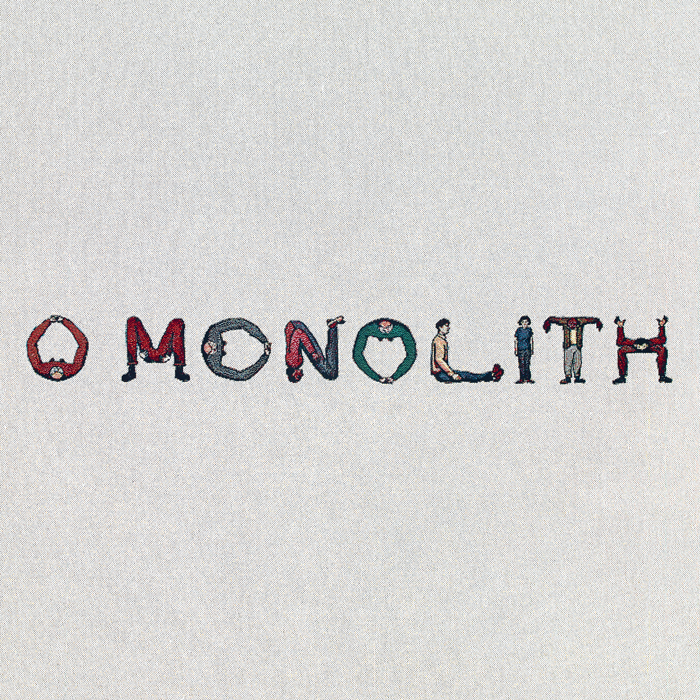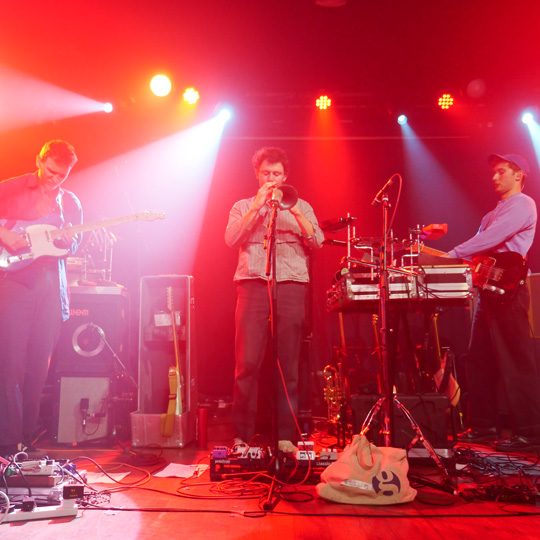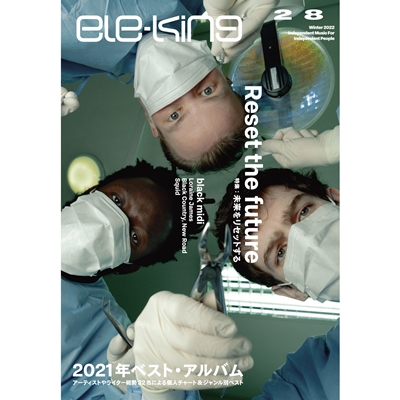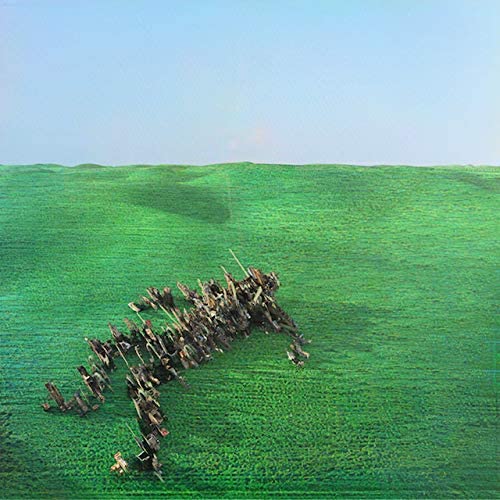MOST READ
- interview with xiexie オルタナティヴ・ロック・バンド、xiexie(シエシエ)が実現する夢物語
- Chip Wickham ──UKジャズ・シーンを支えるひとり、チップ・ウィッカムの日本独自企画盤が登場
- Natalie Beridze - Of Which One Knows | ナタリー・ベリツェ
- 『アンビエントへ、レアグルーヴからの回答』
- interview with Martin Terefe (London Brew) 『ビッチェズ・ブリュー』50周年を祝福するセッション | シャバカ・ハッチングス、ヌバイア・ガルシアら12名による白熱の再解釈
- VINYL GOES AROUND PRESSING ──国内4か所目となるアナログ・レコード・プレス工場が本格稼働、受注・生産を開始
- Loula Yorke - speak, thou vast and venerable head / Loula Yorke - Volta | ルーラ・ヨーク
- interview with Chip Wickham いかにも英国的なモダン・ジャズの労作 | サックス/フルート奏者チップ・ウィッカム、インタヴュー
- interview with salute ハウス・ミュージックはどんどん大きくなる | サルート、インタヴュー
- Kim Gordon and YoshimiO Duo ──キム・ゴードンとYoshimiOによるデュオ・ライヴが実現、山本精一も出演
- Actress - Statik | アクトレス
- Cornelius 30th Anniversary Set - @東京ガーデンシアター
- 小山田米呂
- R.I.P. Damo Suzuki 追悼:ダモ鈴木
- Black Decelerant - Reflections Vol 2: Black Decelerant | ブラック・ディセレラント
- Columns ♯7:雨降りだから(プリンスと)Pファンクでも勉強しよう
- Columns 6月のジャズ Jazz in June 2024
- Terry Riley ——テリー・ライリーの名作「In C」、誕生60年を迎え15年ぶりに演奏
- Mighty Ryeders ──レアグルーヴ史に名高いマイティ・ライダース、オリジナル7インチの発売を記念したTシャツが登場
- Adrian Sherwood presents Dub Sessions 2024 いつまでも見れると思うな、御大ホレス・アンディと偉大なるクリエイション・レベル、エイドリアン・シャーウッドが集結するダブの最強ナイト
Home > Reviews > Live Reviews > Squid- @渋谷WWWX
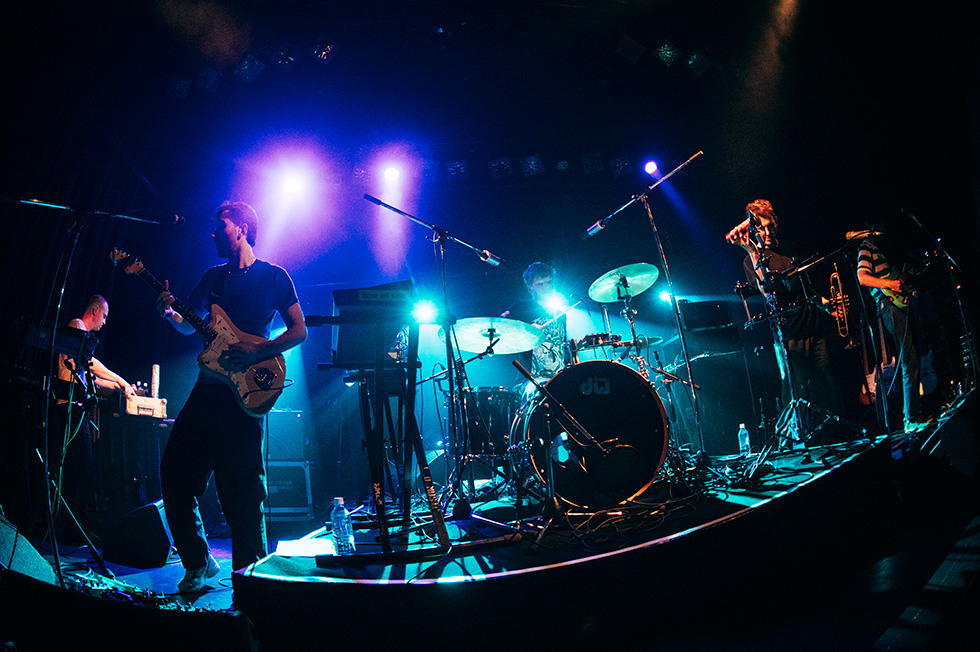
ロックの死については、勝利のときも、嘆きのときも、度々宣言がなされてきたが、それはまだ死んではいない。何が起こったかといえば、ロックは、ポピュラー・カルチャーの中心としての立ち位置を失い、ジャズやカントリーのように、音楽の多数のニッチのひとつに落ち着きはじめ、ブランド志向のポップ・スターが利用する一連の記号や象徴となってはいるが、もはやスターたちが煌めく星座の中心に位置するものではなくなったのだ。
これには多くの含みがあり、そのひとつが、威張って闊歩するようなロック・スターの伝統的な感覚は、ますます不条理に見えはじめていることだ。死んだ時代の寂しい遺物は、手に入れたパワーとシンボリズムにしがみつくが、それらが自らの指の間からこぼれ落ちるのを目にしながら、過去へと遠ざかっていく。
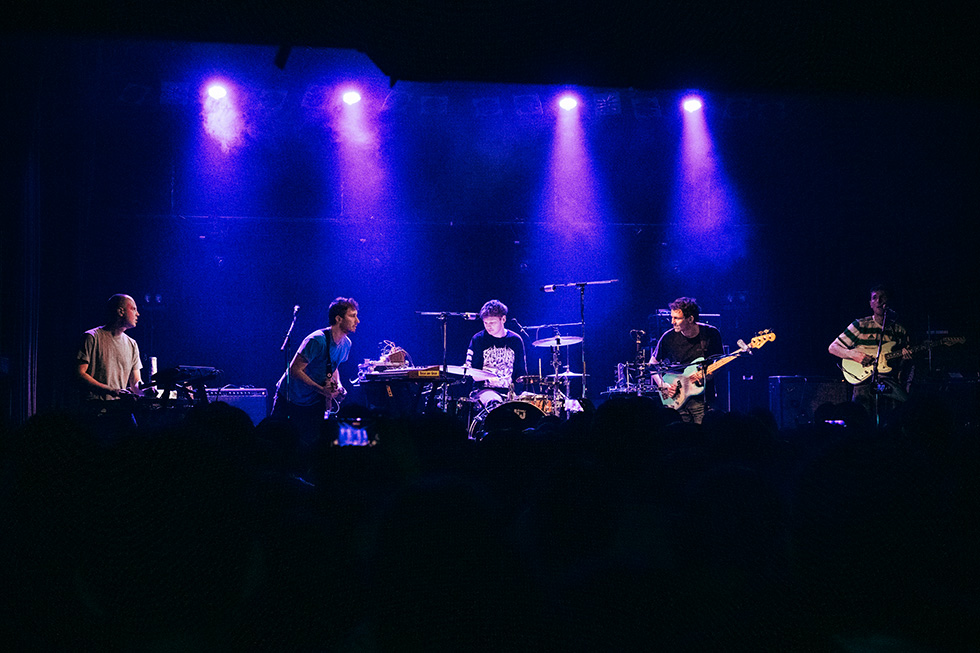
スクイッドは、この立派で新しい世界には理想的なバンドなのかもしれない。ステージ上では5人がフラットな形で一列に並び、フロントマンにもっとも近いのは、歌うドラマーのオリー・ジャッジだが、その玉座は他のバンド・メンバーと同じ高さにあってそれ以上には上昇せず、どのメンバーも真の中心的な存在であることを示そうとはしない。ジャッジはロック・スターとしての存在感を、フリックするような軽いたたきや、華麗な身ぶりで表現するが、それも音楽の絶え間なく変化するダイナミクスに気を引かれて観客の意識がステージ上を行ったり来たりする瞬間に、通り過ぎてしまう。
たまに音楽家が口にする、「音楽だけがすべてだ」という、用心深さからくる、回りくどい主張がある。それは決して真実ではないし、達成するのが不可能で矛盾した純粋さであるかもしれないが、おそらくスクイッドは、誰よりもこの主張が似合うバンドではないだろうか。彼らのライヴ・セットは、5人のメンバー全員がリズムを奏でることからはじまり、ベース、ドラムスとパーカッションに何層にも重なる強烈な焦点が当てられることで、観客の注意を、彼らが音響的にどのようなことをしていて、次の70分ほどをどう設定するかの役割を担っていることに向けさせる。徐々に役割分担が変わっていき、ひとつのセットでひとつの楽器に留まる者はおらず、ときには1曲中に2回、3回と楽器を持ち替えることもある。彼らは皆、自らをマシンの交換可能な部品として、ステージ上でのエゴよりも音楽に奉仕するのだ。
絶えず繰り返される役割分担の変化による副次的な影響として、バンドにはもったいぶったロック・スターのフロントマンや、名人芸を披露するギター・ヒーローも存在しない。それは決して、このバンドが緊密なプレイをし、必要なときには爆発的な力を発揮することができないというわけではない。彼らは、その音楽性を売りにしているわけではなく、その激しさと、完全無欠に訓練された編成による、絶妙なバランスを売りにしているのだ。
このことが、スクイッドを冷血なマス・ロックの音楽エンジンのように見せているとしても、UKで過剰なほどの宣伝がなされ、〈Warp〉のようなレーベルがバックにいるバンドにしては、限りなくクラブに近い体験ができるほど小さな会場に詰め込まれた観客からは、そのような反応は感じられない。オープニングでの強烈なリズムで観客を魅了したバンドは、一度も彼らに直接呼びかけることなく、ほぼセットを通して、彼らを乗せていく。かわりに、ダイナミックな変化とギア・チェンジを頼りに、錯乱したカーディアックスのヒステリックなプログ・パンクから、恍惚としたアンビエント・ウェーヴまでの広い範囲の先端に触れていく。スクイッドに、いわゆるロック・ヒーローのような役回りの者がいないことが、複雑で絶え間なく変化する音の波の中で、私たち全員を彼らとともに音楽に乗せていくのに役立つのかもしれない。ステージ上での集団的なダイナミズムは、私たちをロック・スターのキリストのような人物の受け身なフォロワーへと導くのではなく、ギャングとしてプレイしているゲームの中へと誘い込むのだ。
もちろん、彼らのバンドとしての成功もその助けになっている。デビュー・アルバム『Bright Green Field』が、爆発するようなアイディアと音楽的な野心との間の、鋭さと厳しいコントラストの中で、自分たちのコントロールが効かないことを楽しむ若いバンドのサウンドだったのに対し、ニュー・アルバム『O Monolith』は、自分たちのツールをよりよく使いこなす(楽器とソング・ライティングの両方で)アーティスト集団であることをさらけ出している。ステージ上では、それが音楽の両極間で、そのつなぎの部分をほぼ感じさせずに観客を翻弄するというパワフルな才能へと転化される。曲たちは融合し、キャッチーなヴォーカルのリフレインは、実験的なシークエンスから飛び出し、インダストリアルな激しい鼓動の中からフックが立ち現れて、馴染み深い曲の到来を告げる。
とはいえ、スクイッドは、いまでも全く “音楽だけがすべて” というわけでない。重要なのは、音楽が何をするかであり、彼らの場合は、衝撃的で、眩暈を起こすほどの強烈な、フィジカル(身体的)な体験を生み出すことなのだ。そして、スクイッドのメンバーが、派手なプレイをするのを控えたとしても、彼らは舞台裏に隠れて見えないような操り人形的なグループからはほど遠い。むしろ、彼らのパフォーマンスの多面的な相互作用は、マシンをより人間的で、歓迎され、より楽しく、孤独ではないものにしていく。それは、現代のロック・スターをも嫉妬させてしまうかもしれない。
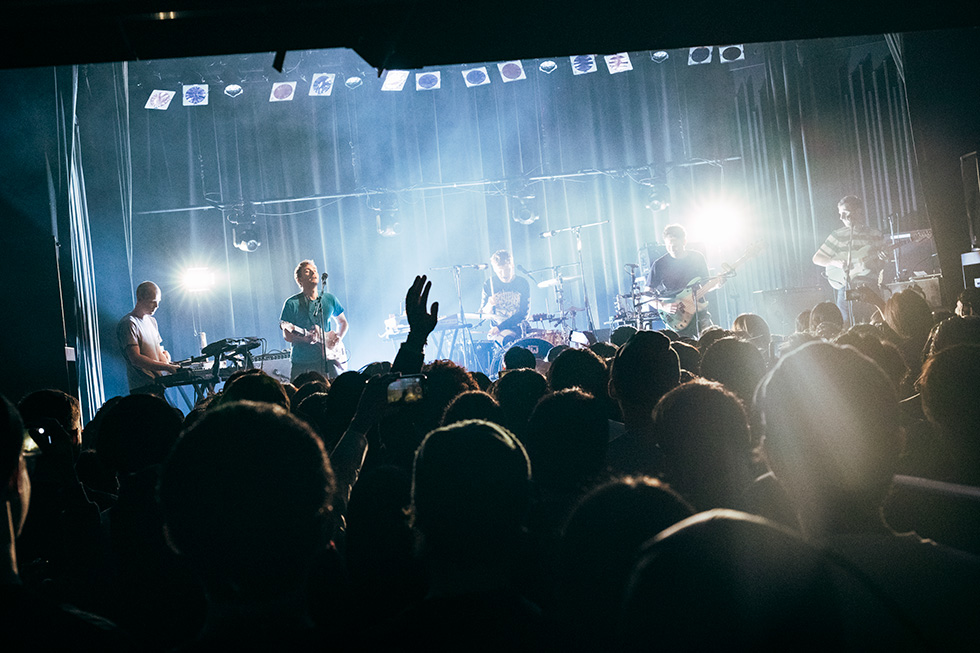
Squid at Shibuya WWWX
on 27th November 2023
written by Ian F. Martin
The death of rock music has been proclaimed many times, either in triumph or lament, and it’s not happened yet. What has happened is that rock has lost its position at the heart of popular culture and started to settle into position as one of music’s many niches, like jazz or country — a set of codes and symbols for the brand-driven pop stars to draw from, but no longer a core part of that constellation of stars.
This has many implications, but one of them is that the idea of the rock star in the swaggering, traditional sense begins to look more and more absurd — a lonely relic from a dead age, grasping for a power and symbolism that is visibly slipping between his fingers, away into the past.
Squid might be a band ideally suited to this brave new world. Lined up onstage in a flat row of five, the closest thing they have to a frontman is singing drummer Ollie Judge, raised up on his throne only to the same elevation as his bandmates and no higher, and no individual member presents as a true focal point. Judge communicates his rock star presence, such as it is, in flicks and flourishes that blink past in a vanished moment as your attention flickers back and forth across the stage, tugged this way and that by the music’s constantly shifting dynamics.
There’s a cagey and circular claim that musicians sometimes make, that “it’s only about the music”. It’s never true, and might be an impossible and contradictory sort of purity to achieve, but Squid could perhaps make as good a claim as anyone. Their set opens with each of the band’s five members on rhythm, the intense and layered focus on bass, drums and percussion forcing the crowd’s attention onto the what they’re doing sonically and the role it plays setting up the next seventy minutes or so. Gradually, they begin to shift roles, no one sticking to a single instrument for the whole set, sometimes changing two or three times within a single song. They make themselves interchangeable parts of the machine, serving the music ahead of any onstage ego.
One side-effect of this constant shifting of roles is that, just as there’s no strutting rock star frontman, there’s no virtuoso guitar hero either. That’s not to say that the band aren’t tight, and explosive when needs arise, but it means that they don’t sell themselves particularly on their musicianship but rather on this fine balance of intensity and immaculately drilled organisation.
If this makes Squid seem like a cold-blooded math-rock musical engine, it doesn’t feel like that from the crowd, packed into a venue small enough to provide something as close to a club experience as you can get — at least for a band with such UK hype and a label like Warp behind them. Having hooked the audience in those opening, intensely rhythmical moments, the band carry them along for nearly the whole set without once stopping to address the crowd directly. Instead they rely on the dynamic changes and gear shifts, ranging from hysterical prog-punk that touches the deranged peaks of the Cardiacs to blissed-out ambient waves. Squid’s lack of anyone in any of the obvious rock hero roles might even be what helps them bring us all along with them through such complex and constantly-changing sonic tides, the collective onstage dynamic inviting us into a game they’re playing as a gang rather than leading us as passive followers of some rock star Christ figure.
Their own growth as a band surely helps too, though. Where debut album “Bright Green Field” was the sound of a young band delighting in the edges and harsh contrasts between their exploding ideas and musical ambitions, luxuriating in their own lack of control, new album “O Monolith” reveals a group of artists with greater command of their tools (both in instruments and songwriting). Onstage, that translates into a powerful ability to tease the audience between the music’s extremes while barely seeing the join. Songs merge together, catchy vocal refrains bounce off experimental sequences, and hooks emerge out of throbbing, industrial pulses to announce the arrival of familiar songs.
That said, Squid are still far more than “just about the music” because what matters is what the music does — in this case create an electrifying, dizzying and intensely physical experience. And while Squid’s members might shy away from showboating, they’re far from a group of puppeteers, invisible behind the scenes. Rather the multifaceted interplay of their performance makes the machine more human, more welcoming, more fun, and less lonely. A modern day rock star might even be jealous.
文:イアン・F・マーティン
ALBUM REVIEWS
- Loula Yorke - speak, thou vast and venerable head/ Loula Yorke - Volta
- Actress - Statik
- Black Decelerant - Reflections Vol 2: Black Decelerant
- High Llamas - Hey Panda
- The Stalin - Fish Inn - 40th Anniversary Edition -
- KRM & KMRU - Disconnect
- Cornelius - Ethereal Essence
- Kronos Quartet & Friends Meet Sun Ra - Outer Spaceways Incorporated
- Martha Skye Murphy - Um
- Mouchoir Étanche - Le Jazz Homme
- Taylor Deupree - Sti.ll
- John Cale - POPtical Illusion
- Amen Dunes - Death Jokes
- A. G. Cook - Britpop
- James Hoff - Shadows Lifted from Invisible Hands


 DOMMUNE
DOMMUNE